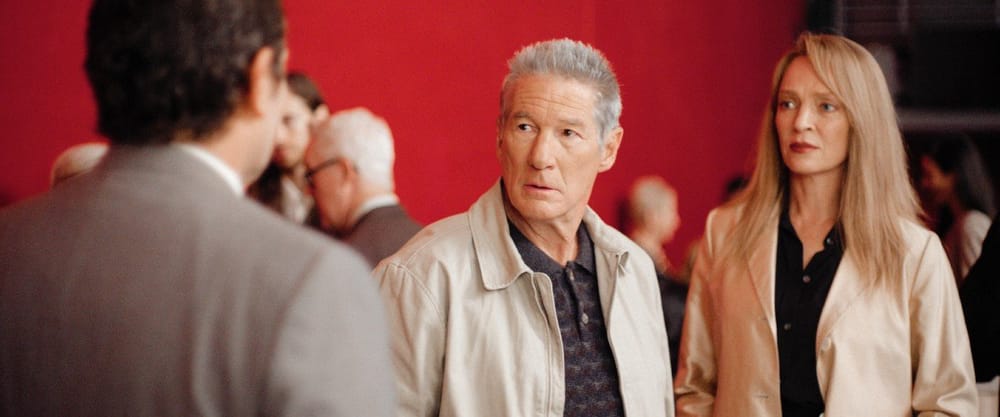Oh, Canada marks a change of pace for Paul Schrader following the completion of his Man in a Room trilogy (First Reformed, The Card Counter, The Master Gardener). Still, it isn’t difficult to see what drew him to Russell Banks’ 2021 novel Foregone and its narrative about an ailing filmmaker grappling with the mythology surrounding his career, one that no less includes the kind of calls to action among which many might count First Reformed.
Employing the framework of Banks’ work, Oh, Canada is built around an interview leftist-documentarian Leonard Fife (Richard Gere, reuniting with the director for his least glamorous role yet, after Schrader helped turn him into a sex symbol with American Gigolo) is giving two of his former students (Michael Imperioli and Victoria Hill). However, this is no ordinary project, as the pair, to whom he disparagingly refers as Canada’s Mr. and Mrs. Ken Burns, has been entrusted with recording his dying confession to the world and, more importantly, his wife, Emma (Uma Thurman).
Fife’s recollections begin in the sixties (he’s played, mostly, in these segments by Jacob Elordi). On the eve of purchasing a property in Vermont, he’s asked by his pregnant wife’s wealthy southern family to reconsider the move in exchange for the head position at their brand of footcare products. Though he claims to be relocating because of limited professional opportunities in Virginia, the decision is actually rooted in personal distaste for his podiatry-baron in-laws.
We follow Fife up north, where, for reasons he’s now intent on clarifying, he decides to abandon his family and seek asylum in Canada. We’re told during the present-day interview that he would go on to make documentaries that disrupted the trade of illegally-poached seals and exposed the American government’s testing of Agent Orange on Canadian farms.
Emma’s ill feelings toward their guests, whom she knows from their days together as Fife’s pupils, are quickly made apparent by a polite but nevertheless terse demeanor that becomes more openly hostile as she begins to feel her husband’s incoherency is being seized for sensationalistic gain. Fife seems to have a purpose for all this in mind but can’t help digressing before restarting and losing focus all over again, like a ghost unglued from time.
Such a recursive structure succeeds or fails based on how strongly the assembled fragments resonate; for better or worse, Oh, Canada is a highly personal film, circling its subject like a plane waiting to land only for Fife to finally realize that the greatest mistake he ever made in his life is…not serving in the military? Or is it that he’s ashamed of cloaking himself in the valor of civil disobedience when really he just needed to escape his wife and her Republican parents? The source material sheds greater insight into what torments Leonard Fife’s final days than the movie does, but Oh, Canada is just ambitious enough to justify the translation from page to screen.
While present-day scenes use the deep, neutral colours and columned aspect ratio of First Reformed, Fife’s memories are shot in widescreen with a washed-out grade that resembles the homage paid to two-strip Technicolor by Scorsese in the first third of The Aviator (DP Andrew Wonder has said the look was inspired by John Huston’s Fat City). Besides being the best-looking film of Schrader’s recent output, Oh, Canada makes the sort of deliberate, thematically-motivated aesthetic choices that feel lacking in, for example, The Card Counter and Master Gardener.
Flashbacks within the two main narrative tracks are presented in a stunningly high-contrast monochrome absent from so much of the format’s modern usage. Generating the sort of semiotic discourse we see Fife entertain during a lecture on Sontag, these impressionistic visual schemes place themselves at odds with Leonard’s almost monastic faith in the camera’s ability to separate fact from fiction.
Just as Banks made no delineation between Foregone’s dialogue and narration, Schrader sends past, present, truth, fever dream, and all the involuntary conflations lying between them flowing into one another.
Director: Paul Schrader
Cast: Richard Gere, Uma Thurman, Jacob Elordi
Writer: Paul Schrader, (based on Russell Banks novel Foregone)
Producers: Tiffany Boyle, David Gonzales, Scott LaStaiti, Luisa Law
Music: Phosphorescent
Cinematography: Andrew Wonder
Editor: Benjamin Rodriguez Jr.
Streaming Availability:

